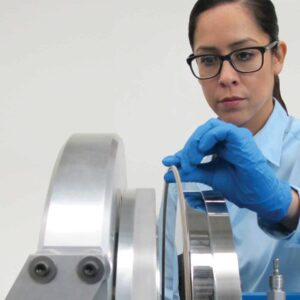 A new test service introduced by Bal Seal Engineering, Inc. offers OEMs verified performance results for Bal Seal spring-energized rotary/face seals used in aerospace and defense gimbal applications. According to the company, the service will help eliminate unnecessary costs, delays and complications associated with in-house or outsourced testing.
A new test service introduced by Bal Seal Engineering, Inc. offers OEMs verified performance results for Bal Seal spring-energized rotary/face seals used in aerospace and defense gimbal applications. According to the company, the service will help eliminate unnecessary costs, delays and complications associated with in-house or outsourced testing.
Aerospace gimbals used for targeting, surveillance, and threat detection require precise positioning and must overcome internal drag to function efficiently. Seals within the gimbals protect sensitive optoelectronics from environmental contaminants that can compromise performance. To minimize stick-slip and meet motor torque requirements, these seals must exhibit very low friction – but they must also minimize leakage over long periods of exposure.
“It’s a balancing act,” says David Fogel, director of business development for Bal Seal Engineering. “Sealing gimbals requires the right mix of friction, leak rate, and service life. We consider all these factors when recommending a seal material, profile and energizer, but testing can reveal opportunities for improvement or refinement. Our new test service gives customers the added confidence of knowing that a seal will meet their requirements upon delivery. They get a better solution and a faster time to market.”
Bal Seal Engineering’s gimbal seal test equipment measures friction and leak rate using customer-defined hardware tolerances and operating conditions, including pressure and speed. Fixtures can accommodate seals up to 22 in. OD, and can be modified for larger seal dimensions. The fixtures can produce a wide range of pressures and exert specific frictional forces to accurately simulate a seal’s performance under real-world conditions.
Rotating plates on the fixtures are connected to digital force testers, which measure the friction of rotation. A vacuum tester simulates air flow over the gimbal during flight. The tester pulls a vacuum across the plates, creating suction inside the seal to measure the leak rate across its surface. Both friction and leak rate are measured simultaneously.
Bal Seal Engineering says the new test service is designed specifically to evaluate the performance of its low-friction spring-energized seals for gimbal applications. These seals, which are machined from polymer-filled polytetrafluoroethylene (PTFE) materials, exhibit an extremely low dynamic coefficient of friction. The seals minimize “stiction” to facilitate smooth rotation and bi-directional motion, and they can be used against a range of material hardnesses/finishes. The seals are energized with a Bal Spring™ canted coil spring, which ensures even wear and longer service life.
Information about the company’s gimbal seal test service offering can be found at www.balseal.com/testing.


















